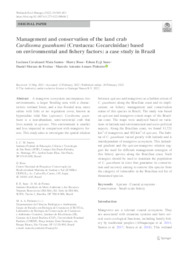Management and conservation of the land crab Cardisoma guanhumi (Crustacea: Gecarcinidae) based on environmental and fishery factors: a case study in Brazil.
Management and conservation of the land crab Cardisoma guanhumi (Crustacea: Gecarcinidae) based on environmental and fishery factors: a case study in Brazil.
Author(s): SANTOS, L. C. M.; BOOS, H.; SANO, E. E.; FREITAS, D. M. de; PINHEIRO, M. A. A.
Summary: Abstract A mangrove ecosystem encompasses two environments, a larger fooding area with a characteristic wetland forest, and a less fooded area, more saline with little or no vegetation cover, known as hypersaline tidal fats (apicuns). Cardisoma guanhumi is a non-abundant, semi-terrestrial crab that lives mainly in apicuns. This environment is smaller and less impacted in comparison with mangrove forests. This study aims to investigate the spatial relation between apicuns and mangroves as a habitat extent of C. guanhumi along the Brazilian coast and its implications on fshery management and conservation status of this species in Brazil. The study was based on apicum and mangrove extent maps of the Brazilian coast. The maps were analyzed based on variations in latitude and environmental and socio-political aspects. Along the Brazilian coast, we found 11,721 km2 of mangroves and 402 km2 of apicuns. The habitat of C. guanhumi varied greatly with latitude and is interdependent of mangrove ecosystem. This latitudinal gradient and the apicum-mangrove relation suggest the need for diferent management strategies of this fshery species along the Brazilian coast. Such strategies should be used to maintain the population of C. guanhumi in sizes that guarantee its conservation and recovery aiming to remove this species from the category of vulnerable in the Brazilian red list of threatened species.
Publication year: 2022
Types of publication: Journal article
Unit: Embrapa Cerrados
Keywords: Caranguejo, Mangue, Mangue de Caranguejo, Pesca
Observation
Some of Embrapa's publications are published as ePub files. To read them, use or download one of the following free software options to your computer or mobile device. Android: Google Play Books; IOS: iBooks; Windows and Linux: Calibre.
Access other publications
Access the Agricultural Research Database (BDPA) to consult Embrapa's full library collection and records.
Visit Embrapa Bookstore to purchase books and other publications sold by Embrapa.

